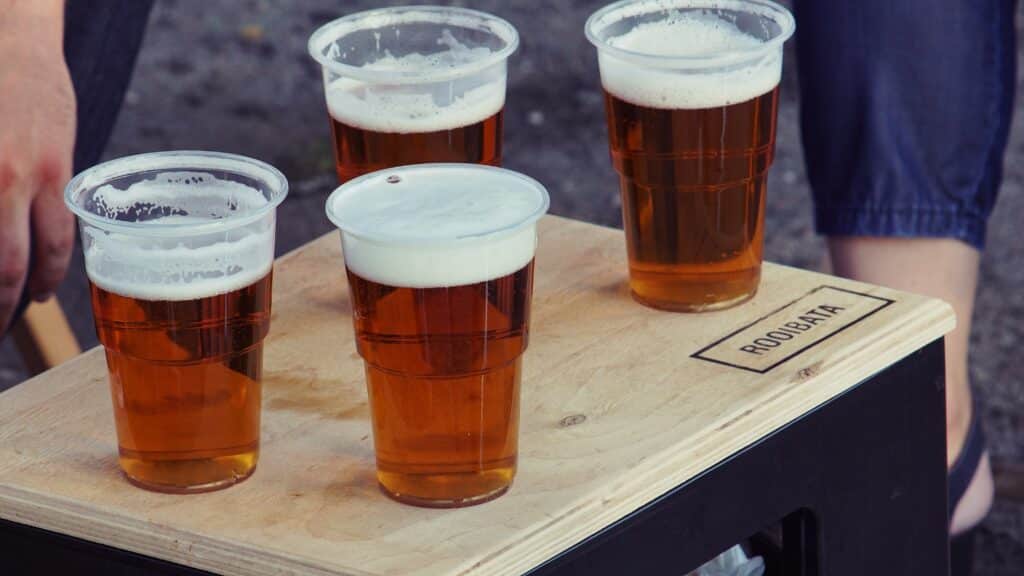
Especially if you're a night owl, mornings are already hard enough. Starting the day with a bloated and gassy abdomen is not the best part of waking up. Some of your late-night habits, including dessert or a glass of wine, may be to blame for that dull feeling.
The occasional bloating in the morning can be the result of lifestyle choices the day or night before. These can lead to constipation or gas, or even bloating and fluid retention.
Causes
Waking up with a swollen abdomen can have a simple origin that can be remedied by changing a few habits. Most people commit one of these causes before going to sleep.
eat something the night before
Eating the wrong foods before bed is often the reason you wake up feeling bloated.
Many of us like to indulge in a sweet treat after dinner, but this may not be the best decision for your digestive system. Too much sugar can cause bloating in some people, but Artificial sweeteners (aspartame, sucralose) can be even more problematic. When eaten in large amounts, these can cause digestive upset, including bloating, gas, and even diarrhea.
eat food with high sodium before bed can also cause your body to retain more water, which causes bloating the next morning. Dips, popcorn, and soy sauce are just a few of the foods that can cause unwanted bloating even hours after you've eaten them.
The solution is to add potassium-rich fruits and vegetables to your breakfast. Bananas, melon and potatoes are high in potassium and can help soothe the stomach. Asparagus, cucumber, and celery can also be helpful.
Also, avoid high-carb breakfasts if you wake up with some discomfort. Breads, cereals, and pastries can make your gut feel tight and bloated, especially if you combine them with foods that are high in lactose, like cheese or cream.
Stress
Everyone goes through stressful periods at one time or another, but this can actually affect the gut and lead to bloating first thing in the morning, especially if we frequently suffer from anxiety.
Although adapting the diet can be useful, there are other options to combat stress and calm the body. Maybe we need better sleep and a meditation practice. Or we may need to modify dietary habits or alcohol consumption. These are all different solutions that could potentially be helpful.

Drink alcohol
Alcohol is another common culprit when it comes to bloating. When you drink a glass of wine (or two) before bed, the alcohol is absorbed by the stomach and small intestine and can cause inflammation. The next morning, this alcohol-induced inflammation can present as unwanted abdominal swelling.
You don't need to completely eliminate your glass of wine in the evening, but it's best to limit yourself to one drink in the evening. Also, try to enjoy your drink as early as possible, to give your body enough time to digest it, and be sure to hydrate before and after.
Eating too soon before bed
The timing of meals is as important as the ingredients. You may want to go to sleep shortly after dinner, but your stomach may not like that plan. Your body needs time to digest, so eating later at night can cause problems like bloating or heartburn.
There is no hard and fast rule when it comes to eating windows – everyone's digestive system is different. But it's probably better to eat at least two to three hours before going to bed to ensure a restful sleep and a bloating-free morning.

Menstrual cycle
Menstruating people are more likely to experience bloating and gas at certain points in the monthly menstrual cycle. The menstrual cycle is usually a period of 24 to 38 days, with menstruation lasting three to five days during which the uterine lining is shed. The menstrual cycle can exacerbate the symptoms of irritable bowel syndrome, which can cause more bloating and gas during menstruation.
PMS is a group of symptoms that begin about a week before a person's period begins. Having more abdominal bloating and gas can also occur during PMS.
Not drinking enough water
Your body is wiser than you probably think. Every part of your system needs water to function properly, and your body is great at balancing the amount of water going in and out.
You are constantly losing fluids through breathing, sweating, and (of course) urinating. But when your body doesn't have enough water to balance the amount it's losing, it begins to retain water in its system (which is why you can go to the bathroom less often). Therefore, if you don't hydrate enough during the day, you may feel the effects in your abdomen the next morning.
Monitoring your urine is a great way to tell if you are adequately hydrating. The ideal is to urinate a light straw yellow color. A dark yellow is a good sign that you are not getting enough fluids.
Not getting enough exercise
Taking a break from exercise can be another reason you wake up bloated. Exercise is part of an overall healthy lifestyle and can help promote proper nutrition and hydration.
While it can't, by itself, fix bloating, it can help keep your system running at its best while also physically helping to move gas around to ease the digestive tract.
Aim to get at least 150 minutes of moderate-intensity cardiovascular activity each week, as recommended by the World Health Organization. Moderate activity can include walking, hiking, or jogging.
Food sensitivity, intolerance and allergy
Food sensitivities occur when the body is unable to process certain substances. When we eat foods that contain this substance, an immune reaction is triggered that produces symptoms but is not life-threatening (as an allergy might be).
Common substances that can trigger food sensitivities and intolerances are gluten and lactose. Food allergies can range from mild to life-threatening. A substance in the food to which we are allergic triggers an immune system response that causes symptoms, including swelling.
Common food allergies include eggs, milk and other dairy products, or tree nuts.
Why do we have gas when we wake up?
While we sleep there is an autonomous control in the anal sphincter. This prevents the release of feces when we fall asleep. And it also controls the release of gases. Therefore, it is likely that we will only pass gas when we regain conscious control of the sphincter in the transition to wakefulness.
It is unlikely that we pass gas while we sleep. We can do this when we awaken, however briefly, to a transitory state of consciousness. The rectum is very sensitive: it can feel if the lower part of the sigmoid colon (called the rectal vault) contains air, feces, or fluid.
This awareness fades when we are asleep, but once we return to awareness, we again recognize these sensations and respond to the needs of the body. This includes the need to pass gas, which seems to happen frequently when we wake up in the morning.
So why do we usually have gas when we wake up? The answer is obvious: we have to. In fact, throughout the night, the healthy bacteria that work in our gut to help us digest food continue to do their job and create gas. As this gas builds up, we may not release it while our autonomic nervous system maintains the anal sphincter closure. However, when we wake up and realize that we need to pass gas, it must inevitably be done.
The volume is greatest after a night of colonic gas filling and may increase further with aerophagia. So it's no wonder we have to fart loudly in the morning.
Can we have gases when sleeping?
People normally fart in their sleep, although they are usually unaware of it. Science suggests that the pressure in the anal sphincter muscle fluctuates in cycles throughout the day. This muscle is more relaxed during sleep and controls whether or not gas present in the large intestine is released. This muscle also spontaneously relaxes several times an hour in the morning. As a result, it is common to pass gas during the night or in the morning.
If we want to fart less at night, it helps to understand what gas is, why humans pass gas, and what factors lead to excess gas. By making lifestyle changes or addressing underlying health issues, we may be able to reduce morning or nighttime flatulence.
It may seem like you have more morning gas, but experts suggest that's not always true. We are less likely to swallow air in our sleep, but actually more likely to fart than when we are awake. This may have to do with the metabolic state of the body while it sleeps, although we remain misunderstood.
It is also likely related to the way your anal sphincter works, your level of relaxation, and the pressures found within the rectum that help us expel gas and stool (poop). Anal and rectal pressures associated with farting and stool are sometimes assessed with an anorectal manometer test, which is often used to treat defecation difficulties in children.
The sphincter controls your ability to pass gas, which is based on specific reflexes and messages from the nervous system. one, named coloanal reflex, works when you fart because it allows both the internal and external anal sphincters to relax, in response to the pressure waves in the rectum.
another, named rectoanal inhibitory reflex, allows the internal sphincter to relax but not the external sphincter. This helps control gas and bowel movements.
People usually don't lose bowel control when they sleep unless there is an underlying medical reason, but the gas itself can pass. On the other hand, sleep inhibits the muscle activity that is involved in these responses, so some people may notice that they have a lot more morning gas when they wake up.
remedies
If a doctor rules out an underlying medical problem as the cause of morning bloating, we may be able to help reduce occasional morning bloating with diet and lifestyle changes. Ideally, these changes should be implemented the day or night before so that we don't wake up feeling bloated.
Dietary changes
Eating too many legumes and cruciferous vegetables can lead to morning bloating, especially if we ate these foods the night before. Eating smaller meals throughout the day and avoiding eating before bed can also help reduce stomach bloating.
Reducing sodium has also been shown to decrease stomach bloating. Some studies have found that bloating from a high-fiber diet can be reduced by cutting back on high-sodium foods. If a food intolerance is suspected, it may be helpful to keep a food diary to share with a doctor. It is not recommended to eliminate essential nutrients without first consulting a doctor.
Drink herbal tea
In addition to increasing your water intake, drinking certain herbal teas can help relieve swelling. The following herbs may decrease occasional swelling:
- Anise
- Caraway
- Chamomile
- Cilantro
- Fennel
- Menta
- Ginger
- Turmeric
Digestive Enzymes
Digestive enzyme supplements may help some people who do not have enough enzymes in their GI tract. These enzymes generally help break down the food we eat and extract its nutrients. Without them, malnutrition, bloating, and other side effects can occur.
If we're curious about digestive enzymes, we'll talk to a doctor first. A specialist can help us determine if the swelling and other symptoms may be related to enzyme deficiencies and recommend the right products for us.
Exercise
Regular exercise can help improve digestion, thus decreasing the risk of bloating. However, even short bursts of activity throughout the day can help.
One small study found that brisk walking for 10 to 15 minutes after meals helped decrease chronic bloating in participants. So it may be advisable to go for a walk for a few minutes after dinner. You can even keep active by tidying up the dishes or preparing the next day's meal.